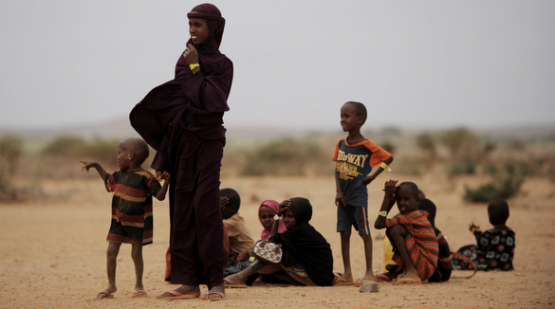
Salesian Missions Responds to Crisis in Horn of Africa, Calls on Public to Make Donations
ADDIS ABABA, Ethiopia (August 19, 2011) – An already difficult situation has become a desperate one in the Horn of Africa where aid agencies like Salesian Missions were already hard at work helping the poor—long before the latest drought and famine that have brought the world's attention to the region once again.
"Entire communities have nothing to eat and people, many of them children, are dying," explained Salesian missionaries serving in the Kakuma refugee camp in northern Kenya. More than 20,000 Somali refugees sought refuge at the camp after fleeing the political instability, hunger and overcrowding of other camps. This brings the total refugees at Kakuma to more than 50,000 with an estimated 1,000 additional Somali refugees arriving daily.
In refugee camps served by Salesians in the area, more than 80,000 people are in need of assistance, according to Brother Cesare Bullo, executive director of the Salesian Planning and Development Office in Addis Ababa, Ethiopia.
Authorities fear that this crisis could become worse than the famine of 1984-85 when more than one million people died. In response, the Salesians have organized an international fundraising initiative aimed to raise at least $850,000 to provide necessary aid for 6 months.
Projects to address the urgent needs of the drought and famine victims include the repair and maintenance of existing wells, drilling of new wells, water distribution and emergency food aid.
The repair and maintenance of four wells will provide a long-term water supply for 8,000 people. In additional, four new wells will be constructed. In total, it is estimated that at least 14,000 people will benefit from these new water sources.
"We have located four water points that need to be rehabilitated and strengthened through the purchase of new pumps and additional excavations to find more water," says Br. Bullo. "The new wells will be built in four areas for local communities very much in need of water at the moment. The wells need to be capable of providing a sufficient quantity of water during the droughts."
The Salesians also have a plan in the works to provide a water tracking service for water distribution in the area around Jijiga, to aid the pastoralist communities. The goal is to distribute 10-12,000 liters of water twice daily.
With 1,000 new refugees arriving daily in Ethiopia from Somalia, Br. Bullo says it takes three to four days for them to register with UNHCR and enter the camp to receive aid.
"They arrive after having walked more than 600 kilometers," says Br. Bullo, emphasizing the urgent nature of the refugees' needs.
"We are working to distribute food outside the refugee camps while they are waiting to be registered," he says, referring to the area of Dolo Ado in the Southern part of Somalia. "We estimate we can provide 2,000 daily rations which means 1,000 people will benefit from the daily distribution for at least three or four days before entering the camps."
Br. Bullo estimates they will help at least 10,000 people outside the camps in the first month.
Salesian Missions calls on the public to make donations, as they are urgently needed to fulfill these essential life-saving projects.
"So far, we have raised about a third of the needed funds and are hopeful that the remaining amount will follow as caring friends and donors learn of the crisis," says Father Mark Hyde, director of Salesian Missions in New Rochelle, NY.
To make a donation, go to www.SalesianMissions.org, click on Donate Now and select "African Famine Fund."
The Salesians specialize in assessing specific needs and identifying best possible emergency interventions to aid as many people as possible. Since they are already established in the communities working to help those in need, they are in a unique position to assess situations and respond.
For example, in Ethiopia the Salesians operate in 14 towns, providing schools, feeding programs, housing for orphans, and HIV/AIDS intervention programs. In Kenya, the Salesians bring classrooms to refugee camps, protect youth from disease, teach agriculture skills, feed hungry children and families, and much more.
PHOTO: ROBERTO SCHMIDT (AFP/Getty)
